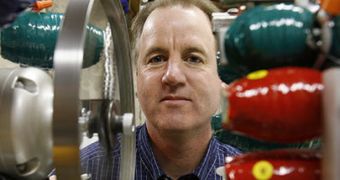Unbelievable! After hundreds of years of scientific experiments clearly proving that perpetuum mobile machines have no place in this particular reality, or parallel universe, call it what ever you want, some people still doubt fundamental physics theories. Like Canadian inventor Thane Heins, for example, who spent the last two decades of his life experimenting with machines that can generate power without any input of energy.
Perpetuum mobile machines, or perpetual motion machines, are experimental mechanical devices that are supposed to work without an input of power into the system, or devices used to obtain more power than that introduced. Just the concept of such devices violates multiple physical laws, such as conservation of energy, the first and second law of thermodynamics.
Even though Heins knows that his machine violates several laws of fundamental physics, he is hoping that someone will see beyond the physical aspect of the problem, and help him fund his own company. The invention spree began back in 1985, when Heins was studying Electronics at Heritage College, in Quebec, and started to think about how could power generators be improved by using different magnet configurations.
He eventually got to build his revolutionary power generator and, during testings, Heins observed that the rotor of the machine experienced supplemental acceleration through some weird process that could not be explained, thus it was generating more electric energy than the mechanical work powering the device. The invention quickly draw the attention of professor Markus Zahn, from the Massachusetts Institute of Technology, a leading expert in electromagnetic and electronic systems, who went in audience to Heins to dismiss his claims.
During a series of experiments, professor Zahn stated that he also observed the acceleration effect, but it might have been caused by the interactions with the permanent magnets. Furthermore, the effect is certainly not determined through perpetual motion processes, or by free energy, but he recognizes that it could be used in future electric energy generation applications, such as electric cars for example.
Nonetheless, Heins says that in his obsession to invent revolutionary machines, he dropped out of the university, lost his wife and children, and is now desperately seeking recognition for his work. Perpetuum mobile or not, it seems to be more efficient than most of the induction motors manufactured today.

 14 DAY TRIAL //
14 DAY TRIAL //